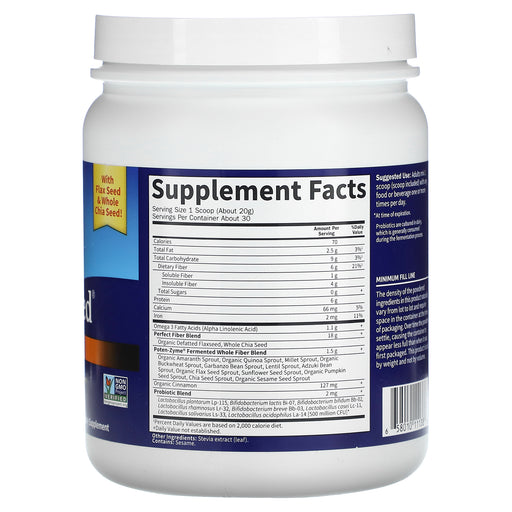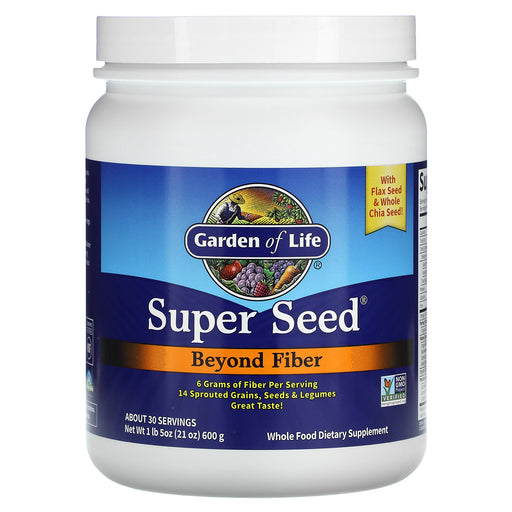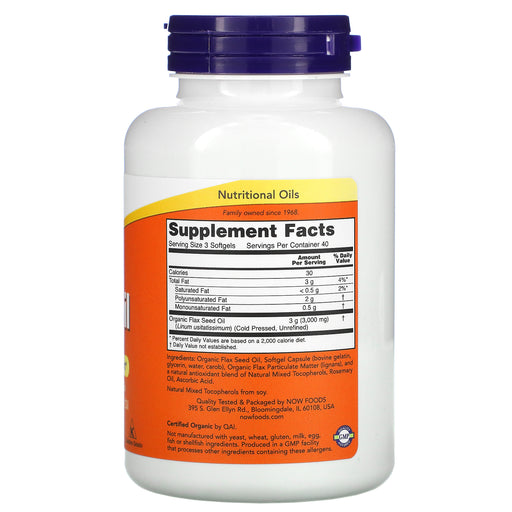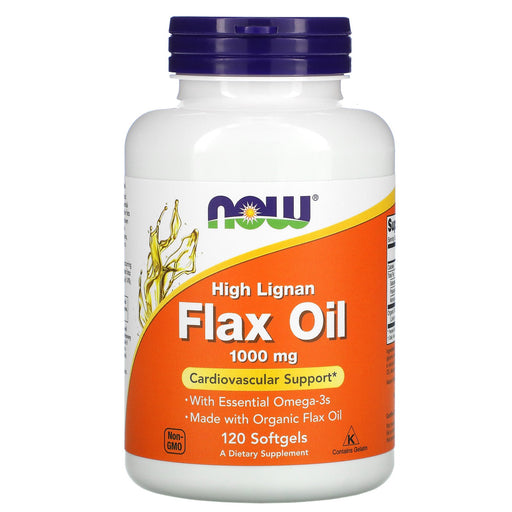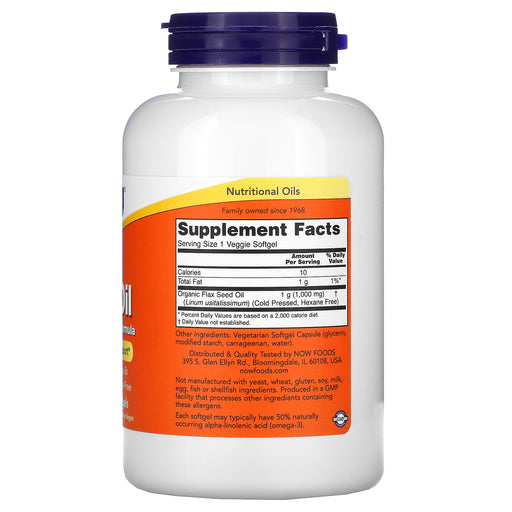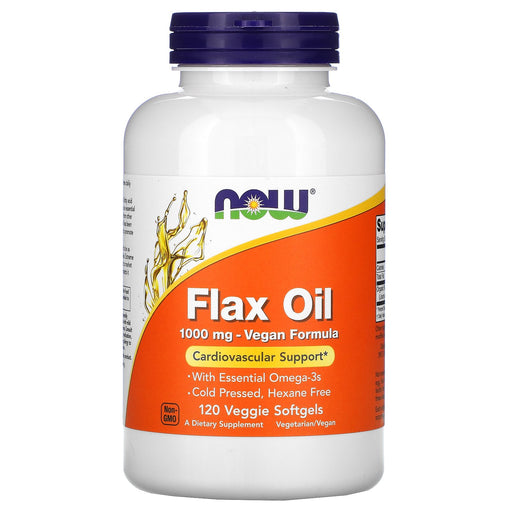
Harnessing the Nutritional Power of Flaxseed for Optimal Health and Wellness
Flaxseed, also known as linseed, is a tiny but mighty superfood that has been celebrated for its numerous health benefits for centuries. Packed with essential nutrients, including omega-3 fatty acids, lignans, and dietary fiber, flaxseed supplements offer a convenient way to incorporate this nutritional powerhouse into your daily wellness routine, supporting heart health, digestive function, hormone balance, and overall well-being.
Key Nutritional Components of Flaxseed
Flaxseed is a rich source of several essential nutrients that work synergistically to promote optimal health:
- Omega-3 Fatty Acids: Flaxseed is one of the best plant-based sources of alpha-linolenic acid (ALA), an essential omega-3 fatty acid that supports heart health, brain function, and inflammation management. Omega-3s in flaxseed work in harmony with other heart-healthy nutrients like vitamin E and coenzyme Q10.
- Lignans: Flaxseed contains high levels of lignans, potent phytoestrogens that have been shown to support hormone balance, breast health, and prostate health. Lignans also exhibit antioxidant properties, helping to protect cells from oxidative stress and damage.
- Dietary Fiber: Flaxseed is an excellent source of both soluble and insoluble fiber, which support digestive health, regularity, and satiety. The fiber in flaxseed works in synergy with prebiotics and probiotics to promote a healthy gut microbiome.
- Plant-Based Protein: Flaxseed contains a good amount of plant-based protein, which is essential for muscle health, tissue repair, and overall growth and development.
- Vitamins and Minerals: Flaxseed provides various micronutrients, including thiamine (vitamin B1), magnesium, phosphorus, and manganese, which support energy metabolism, bone health, and overall wellness.
Benefits of Flaxseed Supplementation
Incorporating flaxseed supplements into your daily routine can offer a wide range of potential health benefits, such as:
- Cardiovascular Support: The omega-3 fatty acids and lignans in flaxseed may help support heart health by promoting healthy cholesterol levels, reducing inflammation, and supporting proper blood pressure regulation. Combining flaxseed with other heart-healthy supplements like fish oil and coenzyme Q10 can provide comprehensive cardiovascular support.
- Digestive Health: The dietary fiber in flaxseed helps support regular bowel movements, promotes a healthy gut microbiome, and may help alleviate symptoms of digestive discomfort. Pairing flaxseed with probiotics and digestive enzymes can further optimize gut health.
- Hormone Balance: The lignans in flaxseed have been shown to support healthy hormone balance, particularly in women, by gently modulating estrogen activity. This may help alleviate symptoms associated with menopause and support overall breast health. Flaxseed can be combined with other hormone-balancing supplements like chasteberry and black cohosh for added support.
- Skin and Hair Health: The omega-3 fatty acids and lignans in flaxseed may help support healthy skin and hair by reducing inflammation, promoting moisture retention, and supporting collagen production. Combining flaxseed with antioxidants like vitamin C and biotin can further enhance its skin and hair benefits.
- Inflammation Management: The omega-3 fatty acids and antioxidants in flaxseed may help support healthy inflammation responses throughout the body, which is crucial for overall health and disease prevention. Flaxseed can be paired with other anti-inflammatory supplements like curcumin and boswellia for a synergistic effect.
Choosing the Best Flaxseed Supplement
When selecting a flaxseed supplement, consider the following factors to ensure you're getting a high-quality, effective product:
- Quality and Purity: Opt for flaxseed supplements from reputable brands that prioritize quality, purity, and third-party testing. Look for products that are free from contaminants, additives, and fillers.
- Nutrient Profile: Choose supplements that provide a comprehensive nutrient profile, including omega-3 fatty acids, lignans, and dietary fiber, to ensure you're getting the full spectrum of flaxseed's health benefits.
- Freshness and Stability: Flaxseed oil is prone to oxidation and rancidity, so look for supplements that are processed and packaged to maintain freshness and stability, such as those in dark glass bottles or with added antioxidants like vitamin E.
- Dosage and Form: Consider your personal preferences and needs when selecting a flaxseed supplement form, such as oil, ground flaxseed, or capsules. Follow the recommended dosage instructions on the product label for optimal results.
- Complementary Nutrients: Some flaxseed supplements may include additional nutrients that work synergistically with flaxseed's components, such as vitamin E, probiotics, or digestive enzymes, for enhanced benefits and absorption.
Tips for Maximizing the Benefits of Flaxseed Supplements
To get the most out of your flaxseed supplement and support overall health and wellness, keep these tips in mind:
- Incorporate into a Balanced Diet: While flaxseed supplements can provide valuable nutritional support, they should be used in conjunction with a balanced, nutrient-dense diet rich in whole foods, fruits, vegetables, lean proteins, and healthy fats.
- Stay Hydrated: Adequate hydration is essential for optimal digestion, nutrient absorption, and overall health. Drink plenty of water throughout the day, especially when taking fiber-rich supplements like flaxseed.
- Store Properly: To maintain the freshness and potency of your flaxseed supplement, store it in a cool, dry place, away from direct sunlight and heat. Refrigeration can help extend the shelf life of flaxseed oil supplements.
- Be Consistent: To experience the full range of potential health benefits, take your flaxseed supplement consistently, as directed, over an extended period.
- Consult with a Healthcare Professional: If you have any pre-existing health conditions, allergies, or are taking medications, consult with a qualified healthcare professional before adding flaxseed supplements to your routine to ensure safety and appropriateness.
Experience the Nutritional Excellence of Flaxseed with Premium Supplements from Health Orchard
Unleash the power of flaxseed for optimal health and wellness with Health Orchard's curated selection of high-quality flaxseed supplements. Our collection features top-tier products from trusted brands, offering a range of options to suit every preference and need.
From pure, cold-pressed flaxseed oil to ground flaxseed powder and convenient capsules, our flaxseed supplements are crafted with premium, nutrient-dense ingredients and manufactured to the highest standards of quality and purity. We also offer synergistic blends that combine flaxseed with complementary nutrients like omega-3s, probiotics, and digestive enzymes for enhanced benefits and absorption.
Elevate your nutrition and support your overall well-being with the power of flaxseed, nature's tiny but mighty superfood. With Health Orchard's commitment to quality, efficacy, and your individual health needs, you can trust that you're getting the best flaxseed supplements available.
Invest in your health and vitality with premium flaxseed supplements from Health Orchard. Explore our collection today and experience the transformative potential of this nutrient-dense seed for yourself!
Frequently Asked Questions about Flax Seed Supplements
1. What do flaxseed supplements do for you?
Flaxseed supplements offer various potential health benefits, including:
- Rich in omega-3 fatty acids, which support heart, brain, and eye health
- High in fiber, promoting digestive health and regularity
- Contains lignans, which may help reduce the risk of certain cancers
- May help lower blood pressure and cholesterol levels
- Can improve blood sugar control in people with diabetes
- May reduce inflammation in the body
Flaxseed supplements are available in various forms, such as ground flaxseed, flaxseed oil, or capsules, making it easy to incorporate into your daily routine.
2. What are the benefits of flaxseed?
Flaxseed offers numerous health benefits, thanks to its rich nutrient profile:
- High in omega-3 fatty acids, particularly alpha-linolenic acid (ALA), which supports heart, brain, and eye health
- Rich in dietary fiber, promoting digestive health, regularity, and satiety
- Contains lignans, potent antioxidants that may help reduce the risk of certain cancers, particularly breast and prostate cancer
- May help lower blood pressure and cholesterol levels, reducing the risk of heart disease
- Can improve blood sugar control in people with diabetes
- May reduce inflammation in the body, which is linked to various chronic diseases
3. Is it okay to take flaxseed every day?
Yes, it is generally safe to consume flaxseed every day in recommended amounts. The typical daily dose of ground flaxseed is 1-2 tablespoons (10-20 grams), which can be easily incorporated into your diet by adding it to smoothies, oatmeal, yogurt, or baked goods. However, it's essential to drink plenty of water when consuming flaxseed, as its high fiber content can cause digestive discomfort or constipation if not accompanied by adequate hydration. Also, if you are taking any medications or have pre-existing health conditions, consult with a healthcare professional before adding flaxseed to your daily routine to ensure it's appropriate for your needs.
4. Who should not take flaxseed?
While flaxseed is generally safe for most people, certain individuals should avoid or use it with caution:
- Those with allergies to flaxseed or other seeds
- People taking blood thinners, such as warfarin, as flaxseed may increase the risk of bleeding
- Individuals with hormone-sensitive cancers, such as breast or prostate cancer, as the lignans in flaxseed may have estrogenic effects
- Pregnant women, as the effects of flaxseed on pregnancy are not well studied
- People with digestive disorders, such as inflammatory bowel disease or diverticulitis, as the high fiber content may exacerbate symptoms
It's always best to consult with a healthcare professional before adding flaxseed to your diet, especially if you have any pre-existing health conditions or concerns.
5. What is the biggest disadvantage of flax?
The biggest disadvantage of flax is its potential to cause digestive discomfort or side effects in some individuals, particularly when consumed in large amounts or without adequate hydration. The high fiber content of flaxseed can lead to:
- Bloating
- Gas
- Abdominal pain
- Constipation or diarrhea
- Nausea
To minimize these side effects, it's essential to start with a low dose and gradually increase your intake, drink plenty of water, and divide your daily dose into smaller servings throughout the day. If you experience persistent or severe digestive discomfort, discontinue use and consult with a healthcare professional.
6. Can flaxseed affect kidneys?
In general, consuming flaxseed in recommended amounts is unlikely to harm healthy kidneys. However, there are a few considerations for people with pre-existing kidney conditions:
- High phosphorus content: Flaxseed is relatively high in phosphorus, which may be a concern for people with advanced kidney disease who need to limit their phosphorus intake.
- Potential drug interactions: Flaxseed may interact with certain medications commonly prescribed for kidney conditions, such as diuretics or blood pressure medications.
- Oxalate content: Flaxseed contains oxalates, which can contribute to the formation of kidney stones in susceptible individuals.
If you have any pre-existing kidney conditions or concerns, it's essential to consult with a healthcare professional before adding flaxseed to your diet to ensure it's safe and appropriate for your needs.
7. What are the negative side effects of flax seeds?
While flaxseed is generally safe and well-tolerated, some people may experience negative side effects, particularly when consuming large amounts or not drinking enough water. Potential side effects include:
- Digestive discomfort: Bloating, gas, abdominal pain, constipation, or diarrhea due to the high fiber content
- Allergic reactions: Itching, rash, hives, difficulty breathing, or swelling in people with allergies to flaxseed or other seeds
- Hormone-related effects: Flaxseed contains lignans, which can have estrogenic effects and may be a concern for people with hormone-sensitive cancers
- Nutrient interactions: Flaxseed may reduce the absorption of certain nutrients, such as calcium or medications, when consumed in large amounts
To minimize the risk of negative side effects, start with a low dose and gradually increase your intake, drink plenty of water, and avoid consuming excessive amounts. If you experience any persistent or severe side effects, discontinue use and consult with a healthcare professional.


